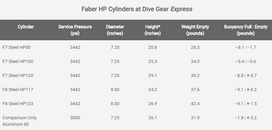- Messages
- 17,332
- Reaction score
- 13,750
- # of dives
- 100 - 199
For just a couple of them, kg = lbs/2, lbs = 2*kg. If a small handful or more: kg = lbs/2 -10%, lbs = 2*kg+10%. That's usually more than accurate enough, even if you're mixing metric and imperial weights on your belt.Get some 2 lb. and even 1 lb. weights and do a proper weight check. Sorry I can't do kgms.
So:
Imperial to metric: 1lb = 0.5kg, 2lbs = 1kg, 10lbs = 4.5kg, 20lbs = 9kg,
Metric to imperial: 1kg = 2lbs, 2kg = about 4.5lbs, 5kg = 11lbs, 10kg = 22lbs




